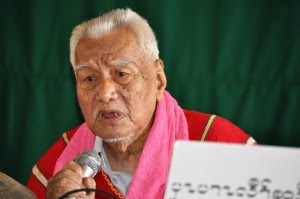General Tamla Baw, one of the most respected Karen leaders has died. General Tamla Baw passed away on Thursday June 26, at 9.24pm in the Thai border town of Mae Saraing.
 General Tamla Baw was a man of deeds and spent his life fighting for freedom, democracy and self-determination for Karen people, and for all the people of Burma.
General Tamla Baw was a man of deeds and spent his life fighting for freedom, democracy and self-determination for Karen people, and for all the people of Burma.
General Tamla Baw love for his people won him respect of not just the Karen people, but also that of the Burmese pro-democracy movement.
Padoh David Tharc Kabaw, vice-chairperson of the United Nationalities Federal Council, in an interview with Karen News, said that General Tamla Baw, was the “longest serving and a selfless Karen revolutionary resistance leader. General Tamla Baw had been true to the Karen revolution and the ‘Four Principles’ of Saw Ba U Gyi, until his last days.”
Padoh David Tharc Kabaw who served as vice-chair to General Tamla Baw, when he held the chair of the KNU told Karen News that the General always fought for what was the best for the Karen people.
“General Tamla Baw never wavered in the face of reactionary ideology and enemy’s trickery. I would compare him with world leaders like Churchill, [Chairman] Mao and Ho Chi Min.
The Burma Campaign UK in a public statement said that, “General Saw Tamla Baw lived for the principles of freedom and democracy. He believed in the unity of all the ethnic nationalities and people of Burma. He was dedicated to the establishment of a federal Burma. He was a shrewd politician who did not fall into political traps set by the dictatorship.”
General Tamla Baw’s commitment to the Karen people resulted in his election as President of the Karen National Union.
The Burma Campaign UK paid tribute to General Tamla Baw’s service in the British Army before he joining the Karen struggle for freedom after Burma gained its independence. General Tamla Baw “regularly reminded Burma Campaign UK of the special debt that the British owed the Karen people as allies during WWII. He never gave up hope that one day the British government would honour that debt and the promises made to the Karen to support their struggle for self-determination. Sadly he never saw that day come to pass. He was also hoping that the British government might one day finally pay him the Army pension it had promised him.”



